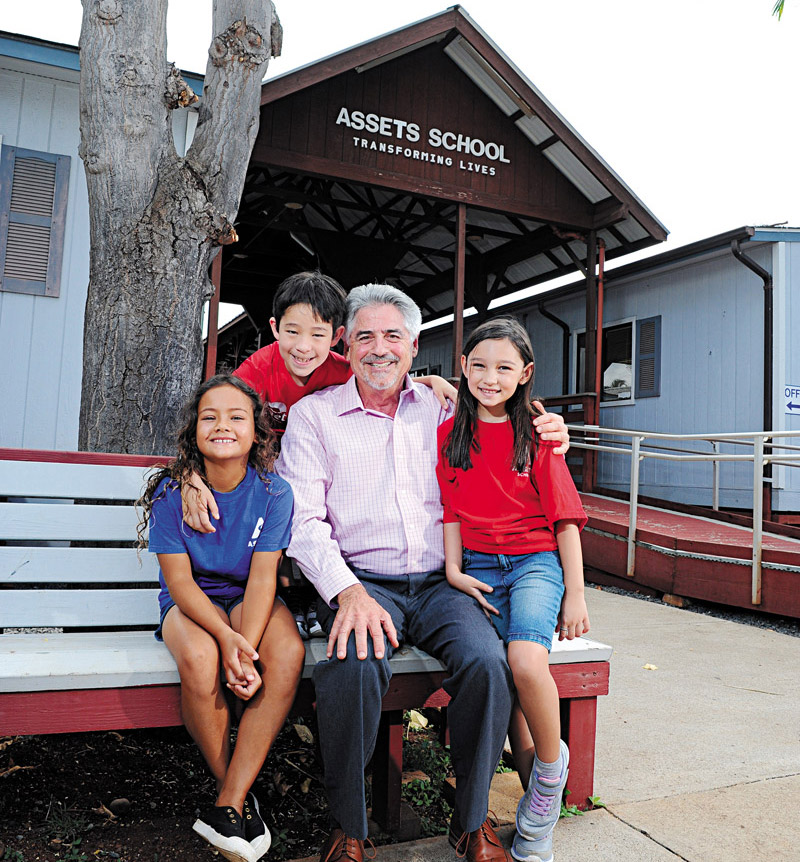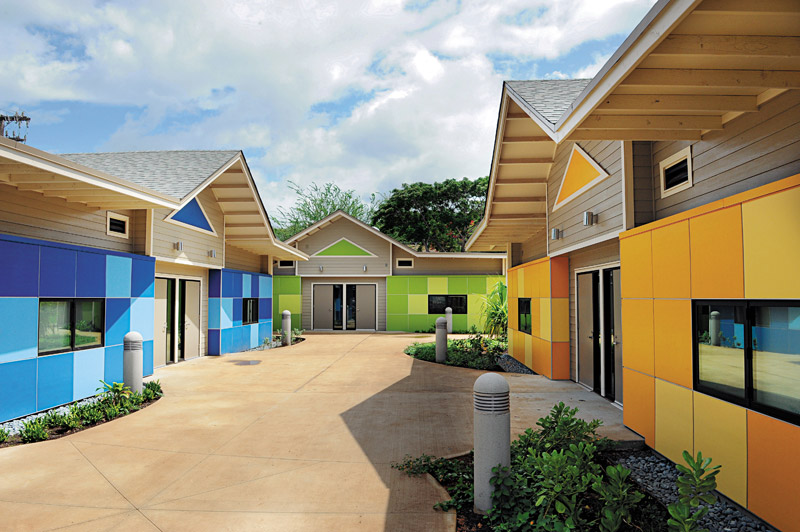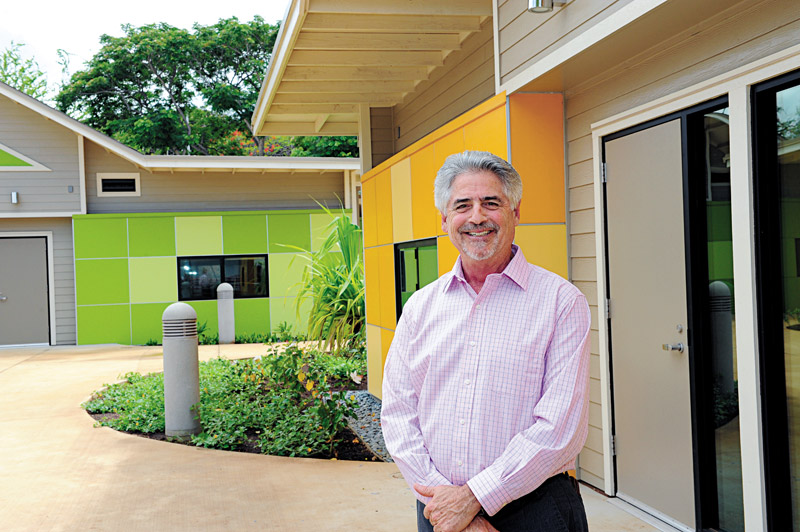Moving Forward With Its Greatest Asset

(From left) Nohea Kiakona, Collin Hanney, Paul Singer and Wai Afong
With Paul Singer at the helm, Assets School is poised to continue its mission of helping gifted students, who learn differently, achieve academic greatness.
Paul Singer didn’t speak a word until he was 3 years old. His high school GPA was a mere 1.9.
But contrary to what others thought, there was nothing wrong with Singer. As he himself puts it, his brain is just wired a little differently.
Singer eventually went on to earn a bachelor’s and two master’s degrees, and later completed a doctoral program at University of Southern California. He taught at California State University, Northridge for three decades, and served as head of school at The Country School in Valley Village, California, for nearly 30 years, too.
Today, Singer is head of school at Assets School, where many of its students are gifted, but simply struggle with conventional methods of learning — a tribulation he understands all too well.

Assets School will welcome students to its new Harry & Jeannette Weinberg K-4 Village next week.
In fact, it’s that firsthand experience that first lured Singer into taking the job at Assets, and one that will continue to guide him as he enters his 11th year at the institution.
“I was one of these kids growing up,” he says. “The social, emotional part of it — I relate to those kids. I know what their experience is because I lived it.”
School was never easy for Singer. By second grade, he had developed deep feelings of inferiority. His self-esteem faltered.
“All of my friends were able to do things that I couldn’t do at that stage in my life, like read,” says Singer. “I was a fifth-grader learning how to read, not a second-grader or first-grader.”
A lot of that frustration translated into acting out. In fact, Singer remembers scoring all U’s (“unsatisfactory”) in the citizenship portion of his eighth-grade report card.
Had it not been for four key individuals — his grandmother, mother, high school dean and college professor — Singer might never have realized his full potential.
His grandmother, for instance, never once stopped believing in Singer, even when his own father couldn’t see past poor grades and bad behavior. His mother patiently helped him with homework through his sophomore year in college.

It was because Singer’s high school dean dropped Your Turn to Curtsy, My Turn to Bow by William Goldman on his desk that he read his first book cover-to-cover in 10th grade. And it was through a college professor so impressed with a sociology paper Singer completed — so much so that she wanted him to revise it for publication — that he truly began to realize his own intellectual abilities.
So it was nothing short of kismet that, years later, Singer found himself working in education, the very field that had once tormented him. He was in his 27th year, or thereabouts, as head of school at The Country School — a hotbed for children of celebrities ranging from Kurt Russell and Goldie Hawn to every one of Charlie’s Angels and all the “godfathers” (Marlon Brando, Andy Garcia and Al Pacino, among them).
Singer had no plans of leaving when he happened to meet then-Hawai‘i Association of Independent Schools executive director Robert Witt during a conference in Santa Barbara.
Witt, as Singer recalls, wasted no time inquiring about the possibility of getting him to move to Hawai‘i. Singer insisted he wasn’t the least bit interested. But Witt convinced him to at least speak with a search consultant in the islands, and Singer soon found himself on O‘ahu for what he considered a three-day vacation.
All of that changed almost immediately, though, when Singer paid Assets a visit.
“I came here, and that was it,” says Singer. “I looked around and I saw 350 kids that reminded me of myself.”
It isn’t uncommon for new students to arrive at Assets having done poorly at their previous schools. These are children who are, Singer explains, in the top 1-2 percentile in terms of intellectual ability.
While they are gifted, they may not necessarily be good at school. They might feel severely alienated and discouraged or even depressed.
All of that changes with the care and attention Assets faculty and staff provide to each child.
“In many cases, they’re not the kid their parents ordered, if that makes sense,” says Singer. “There’s a period of mourning that takes place with our families until, hopefully, through Assets, they come to recognize that their kid is bright and capable of doing anything.”
Such was the case for Collin Hanney, who has been attending Assets for four years and will start fifth grade this fall. Collin was having a tough time as a student in the regular school system, says dad Kevin (owner of 12th Avenue Grill and Koko Head Café). But since switching to Assets, the transformation Collin has undergone is palpable.
“We went from a situation where he really hated school and every day was a battle to get him to go to school, and just generally feeling terrible about things,” says Kevin. “We switched him into Assets and really, immediately, he started loving school.”
At Assets, students learn in small groups. According to Singer, there is no classroom in grades K-8 that has more than 16 kids, and each come equipped with two full-time teachers. The biggest class high school students might encounter, meanwhile, typically numbers about 10 with one teacher.
Instruction is personalized — and no one gets left behind.
As such, Singer seeks out teachers who will take the time to get to know every student, and then tailor each lesson to match their individual needs.
“I don’t believe in equality,” says Singer. “Here’s what I mean by that — that all kids have to be treated the same. I tell teachers all the time, ‘Equal does not mean the same. Equal means each according to their needs.’
“They all have different needs and they all have different reaction patterns,” he adds. “Our job is to develop relationships of mutual trust and mutual respect.”
It’s a method that continues to work well for Assets students. According to Singer, 95 percent of its high school graduates immediately head off to college with success.
To continue to move Assets forward, Singer has a few plans he’d like to see come to fruition. First, major cosmetic changes are in store for its campuses. The high school in Alewa Heights will undergo renovations that will bring its historic buildings up-to-date while maintaining its peaceful setting.
Then, on Aug. 14, the school’s Harry & Jeannette Weinberg K-4 Village at its K-8 campus near Daniel K. Inouye International Airport will open its doors (see accompanying sidebar).
Singer also plans to continue training public and private school teachers throughout O‘ahu, giving them additional tools, as he puts it, to work with a broader spectrum of students. More importantly, he hopes to build an endowment for financial aid that ensures the school never has to turn away potential students.
It may not exactly be the future Singer once saw for himself, but it’s certainly the one he has grown to embrace.
“I didn’t come here for Hawai‘i,” he says. “I’ve grown to love Hawai‘i for a variety of reasons — the first and greatest is the people.
“I think it’s the single greatest — no pun intended — asset to being in Hawai‘i,” he adds, “just the kindness and the authenticity of the people here. I just love being here.”
AN ASSET TO THE COMMUNITY
Founded in 1969, Assets School is the only one of its kind in Hawai‘i that works with students who are gifted but learn di˛ erently, as well as those with dyslexia.
Its K-8 campus currently has roughly 200 children, while the high school is made up of about 150 students. Also offered at Assets’ high school are sports — another factor head of school Paul Singer credits to helping him stay in school.
“I had to stay eligible for sports so at the bare minimum, I had to have at least close to a C, C-minus average,” he recalls.
Sports offered at Assets include football (through Pac-Five), basketball, volleyball, golf and bowling.
All of it makes for a close-knit community that not only helps students but also their families.
“They totally take care of Wai,” says Sarah Afong of her daughter, who will begin first grade this fall. “They care about her education. They care about her well-being. They care about us as a family.”
“One of the differences — and I know other parents have shared this same feeling with me — is something I don’t think I expected to experience in a school or anything like that, is just a feeling of how much your kid is loved by the faculty and administration,” says Kevin Hanney, whose son Collin will be a fifth-grader. “You really feel it.”
IT TAKES A VILLAGE
Last September, Assets School broke ground on its Harry & Jeannette Weinberg K-4 Village. Less than a year later, its three new colorful buildings that house six classrooms, common areas and counselors’ offices will open to students come Aug. 14.
According to the school, the indoor-outdoor “village” includes a student garden, as well as outdoor classrooms. Each classroom also includes a smaller breakout room for personalized learning and attention.
The entire process was a learning experience for students, too. Fifth- and sixth-grade classrooms documented its progress daily and put together time-lapse videos, for example, while first- and second-grade students learned about buildings and dwellings.
“We’re trying to take advantage of this thing happening in our backyard to really integrate it into the curriculum for the kids,” says Ryan Masa, Assets K-8 principal.
A second phase for the school’s middle school also is in the works.
It’s been a long time coming for the nearly 50-year-old school. Its K-8 campus housed all grade levels before the school acquired space in Alewa Heights for the high school. Up until several years ago, the U.S. Navy owned the land its K-8 campus resides on, and as tenants, Assets was not allowed to build permanent structures.
Of course, all that’s changing now.
“These kids deserve a permanent home,” says Paul Singer, Assets head of school. “They need more modern buildings. They need more modern equipment. They need to be able to get out of their cars and feel really proud about the school that they’re attending.”






